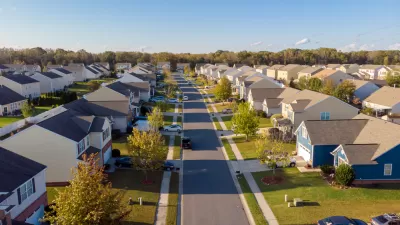Single-family zoning, parking requirements, and minimum lot sizes are on the chopping block in Senate Bill S7574.

The New York State Legislature this legislative session will consider a full suite of planning and zoning reforms. New York State Senator Brad Holyman (D-Manhattan) recently introduced Senate Bill S7574, which would legalize multi-family residential construction almost everywhere in the state, remove parking minimums, and end minimum lot sizes in some parts of the state.
Joe Levinger reports the news about SB S7574 for TheRealDeal:
The legislation would prohibit cities and villages from setting minimum lot sizes larger than 1,200 square feet. It would also bar them from requiring off-street parking.
In cities, landowners could build four-family dwellings on any residential lot, or up to six-family buildings within a quarter mile of a train station. In villages, builders could construct duplexes on any residential lot or six-family dwellings near transit stations.
The bill would put New York State in the company of the rare few states that have preempted local zoning to allow new multi-family developments. First Oregon and then California led the way, followed by, to an extent, Connecticut (an "opt out" provision in Senate Bill 1024 prevents the Constitution State from being included as a full member of the state preemption club).
Holyman is quoted throughout the article explaining the reasoning behind the bill—including a mention of a study by researchers at the NYU Furman Center, "which found that New York has some of the most exclusionary zoning in the country, particularly in the suburban enclaves of Westchester and Long Island."
The article also notes that Holyman is far from a consistent voice of YIMBY politics. Hoylman objected to the recently approved Soho/Noho upzoning, calling it the "Amy Coney Barrett of zoning proposals."
FULL STORY: New York takes aim at apartment bans

Planetizen Federal Action Tracker
A weekly monitor of how Trump’s orders and actions are impacting planners and planning in America.

Maui's Vacation Rental Debate Turns Ugly
Verbal attacks, misinformation campaigns and fistfights plague a high-stakes debate to convert thousands of vacation rentals into long-term housing.

Restaurant Patios Were a Pandemic Win — Why Were They so Hard to Keep?
Social distancing requirements and changes in travel patterns prompted cities to pilot new uses for street and sidewalk space. Then it got complicated.

In California Battle of Housing vs. Environment, Housing Just Won
A new state law significantly limits the power of CEQA, an environmental review law that served as a powerful tool for blocking new development.

Boulder Eliminates Parking Minimums Citywide
Officials estimate the cost of building a single underground parking space at up to $100,000.

Orange County, Florida Adopts Largest US “Sprawl Repair” Code
The ‘Orange Code’ seeks to rectify decades of sprawl-inducing, car-oriented development.
Urban Design for Planners 1: Software Tools
This six-course series explores essential urban design concepts using open source software and equips planners with the tools they need to participate fully in the urban design process.
Planning for Universal Design
Learn the tools for implementing Universal Design in planning regulations.
Heyer Gruel & Associates PA
JM Goldson LLC
Custer County Colorado
City of Camden Redevelopment Agency
City of Astoria
Transportation Research & Education Center (TREC) at Portland State University
Jefferson Parish Government
Camden Redevelopment Agency
City of Claremont





























